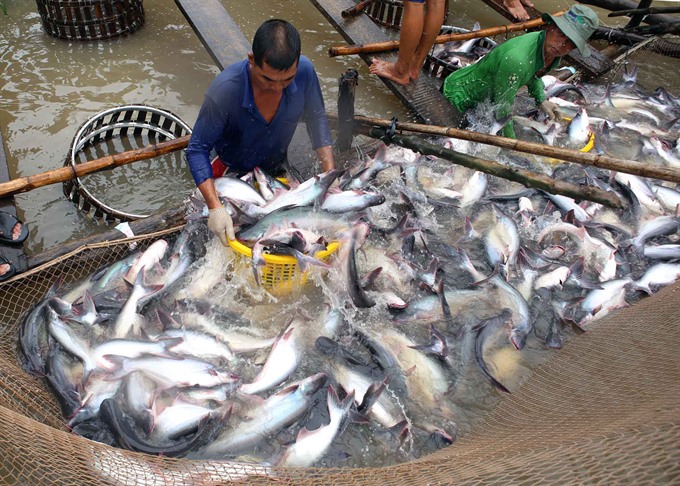A list of best and worst legal regulations of 2016 compiled by the Viet Nam Chamber of Commerce and Industry (VCCI) has been received by relevant ministries with varying degrees of acknowledgement and skepticism.

A list of the best and worst regulations of 2016 compiled by the Viet Nam Chamber of Commerce and Industry (VCCI) has been received by concerned ministries with varying degrees of acknowledgement and skepticism.
The first such exercise carried out by the VCCI fulfills part of its mandate under Government resolutions to provide feedback from businesspeople and contribute to improving the business environment, officials said.
The Ministry of Agriculture and Rural Development (MARD) has stood out in declaring that it will look into the five regulations that the VCCI has considered poor and initiate remedial measures.
Very soon after the list was announced, MARD Deputy Minister Ha Cong Tuan sent an official document to the VCCI expressing the ministry’s wish to improve the said regulations.
He said the ministry will request the Government to reconsider regulations on catfish farming, processing and exporting, effecting amendments to favour businesses and farmers. Specifically, the ministry will not impose a limit on the amount of ice and humidity in exported catfish products.
The Agriculture Ministry also confirmed that it had received VCCI’s feedback on its regulations in June 2016, but administrative factors had delayed an immediate response.
Meanwhile, the Ministry of Investment and Planning (MoIP) responded to being one of the top three ministries with poor regulations on VCCI’s list with a caveat.
MoIP Deputy Minister Dang Huy Dong said VCCI’s rankings depended largely on the subjectivity of questions and criteria it was based on. Since he did not know the institution’s actual method of assessment, he could not comment on its validity.
“VCCI’s ranking is just one way for people to have their say, so it should be approached with caution. If a regulation is inadequate, we will accept constructive criticism on it, not a few selective comments,” said Dong.
“We are ready to work with the VCCI in a serious manner,” he added
Dau Anh Tuan, head of VCCI’s legal department, confirmed that out of 30 “poor” legal regulations announced by his institution, seven had been altered by concerned ministries, while 13 are set to be amended within the framework of another law-building programme.
“This is the positive reaction that we expect the ranking to have,” he said.
This leaves about 10 regulations untouched, some of which he believed would remain, despite objections.
One of these could be Circular 57, issued by the Ministry of Public Security (MPS), which requires vehicles to be equipped with fire extinguishing devices.
The MPS has informed the VCCI that Ministry of Justice has ruled the circular valid.
Likewise, the Ministry of Transport’s decision that transportation service providers within municipalities should have at least 20 vehicles at hand in order to operate an established route is likely to be kept, despite the VCCI arguing that this would hinder the growth of small and very small businesses, and that the scale of operation will have no bearing on traffic safety.
Shift in approach
Expounding further on the VCCI’s expectations of the rankings, Tuan said: “The movement itself is positive, but businesses want bigger changes in policymakers’ approach – to issue regulations that function as incentives, instead of just removing current obstacles.”
In this context, regulations that allow undervalued divestment for State enterprises or the removal of certain procedures for registration or investment permits, for both domestic and foreign investors, would be welcomed very much by businesses.
“When the market situation changes, the ability to take the initiative and alter regulations to lessen the negative side-effects of policies should be a goal for the State…,” Tuan said.
Several experts concurred with Tuan. Nguyen Dinh Cung, Director of the Central Institute for Economic Management (CIEM), said that should ministries and departments continue to neglect businesses’ requests, the Prime Minister’s pledge to deliver a constructive government for the people would not be fulfilled.
Vu Tien Loc, VCCI Chairman, said he saw the rankings as an important step for policymakers to analyse and take decisions to benefit producers.
“The VCCI has collected and reflected opinions and wishes from businesspeople to advise the Party and the government on socio-economic policies, a task it was assigned under Resolution 19/NQ-CP, which deals with reforming and improving the business environment, and increasing national competitiveness; as also Resolution 35/NQ-CP on supporting business development until 2020,” Loc said.
Businesses ranked 114 regulations as "best" and 123 as "worst" among 9,297 nominations made by people from different Government agencies and business associations.
The exercise is expected to help government officials build laws and policies that create a convenient and transparent business environment, boost creativity and healthy competition.
The VCCI has officially requested the Prime Minister to commend ministries and departments whose regulations have been deemed good, and ask others to take corrective action soon. — VNS





